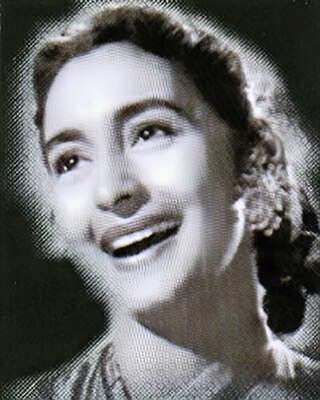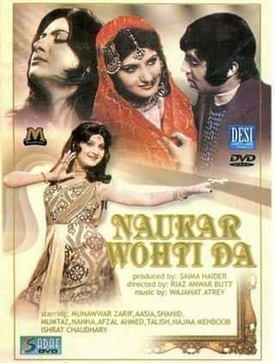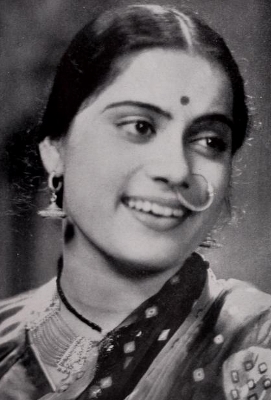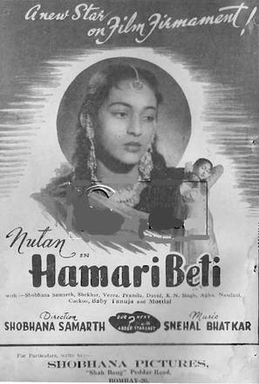Related Research Articles

Noor Jehan was a Pakistani playback singer and actress who worked in both British India and later in Pakistan's cinema. Her career lasted over six decades, during which she recorded 10,000 songs. Jehan had proficiency in Hindustani classical music, as well as in other genres such as Punjabi and Sindhi. She made her directorial debut with the film Chann Wey in 1951, becoming the first female film director in Pakistan. She is recognized for her contributions to music in the Indian subcontinent, particularly in Pakistan. She was given the title of Malika-e-Tarannum in Pakistan.

Nutan Samarth-Bahl, known mononymously as Nutan was an Indian actress who worked primarily in Hindi films. In a career spanning four decades, she appeared in more than 80 films, that ranged in genre from urban romances to socio-realist dramas. Regarded as one of the finest actresses in the history of Indian cinema, Nutan was noted for her naturalistic acting in parts of conflicted women often deemed unconventional. She was the recipient of six Filmfare Awards, including a record five Filmfare Award for Best Actress. In 1974, Nutan received the Padma Shri, India's fourth highest civilian award.
Syed Shaukat Hussain Rizvi was a Pakistani actor, film producer and director. He is widely considered as a pioneer of the Pakistani film industry.
Rajkumari Dubey, better known by her first name, Rajkumari, was an Indian playback singer who worked in Hindi cinema of 1930s and 1940s. Best known for her songs, "Sun Bairi Baalam Sach Bol Re" in Bawre Nain (1950), "Ghabaraa Ke Jo Hum Sar Ko Takraayan" in Mahal (1949) and "Najariya Ki Maari" in Pakeezah (1972).
Ghulam Haider (1908 – 9 November 1953; also known by the honorary title Master Ghulam Haider) was a Pakistani music composer who worked both in India and later in Pakistan after its independence in 1947.
The Shahnoor Studios is the studio taken over by Syed Shaukat Hussain Rizvi and his first wife, Noor Jehan in the aftermath of the independence of Pakistan in 1947. The studio is one of the oldest studios in Lahore, Pakistan and was previously known as Shori Studios.
Shobhana Samarth was an Indian director, actress and producer, who began her career in the early days of talkie movies in the Hindi film industry and continued in lead roles into the 1950s.

Chandra Mohan was an Indian actor, known for his work in Hindi cinema in the 1930s and 1940s. He became known for his villainous roles in a number of critical and commercial successes.
Nauker or Naukar may refer to:
Mumtaz Mahal is a 1944 Indian Hindi-language historical epic film, directed by Kidar Nath Sharma and starring Khursheed Bano and Chandra Mohan.

Ram Rajya is a 1943 Hindi film, directed by Vijay Bhatt, with Prem Adib and Shobhna Samarth in the lead roles of Rama And Sita. It was the third highest grossing Indian film of 1943.

Naukar Wohti Da is a 1974 Punjabi-language Pakistani film, starring Munawar Zarif in the lead role, opposite Aasia. The film tells the story of a hired husband. It was remade in Hindi as Naukar Biwi Ka (1983).
Kokila (transl. Nightingale) is a 1937 Hindi social family drama film directed by Sarvottam Badami. The music was composed by Anil Biswas with lyrics written by Siddiqui and Zia Sarhadi. The story was adapted from the well-known novel Kokila, written by Gujarati writer Ramanlal Vasantlal Desai. The film starred Motilal, Sabita Devi, Shobhna Samarth, Maya Bannerjee, Sitara Devi, Pesi Patel, Siddiqui and Kayam Ali.
Sajani is a 1940 Hindi social film directed by Sarvottam Badami for Sudama Productions. Scripted by Zia Sarhadi, the film had music by Gyan Dutt and starred Prithviraj Kapoor, Sabita Devi, Snehprabha Pradhan, Noor Jehan, Dixit, and Ghory. Badami left Sagar Movietone where he had made satirical comedies to join his "mentor" Ambalal Patel at Sudama Productions to make "socially relevant film(s)", where Sajani was one of the first. Snehprabha Pradhan acted in several films produced by Chimanbhai Desai in 1940, including Sajani.

K. Amarnath was one of the earliest film makers of Indian Cinema. His career as a movie producer and director spanned over four decades in the film industry.
Rambaan is a 1948 Indian Hindi-language mythological drama film directed and produced by Vijay Bhatt and written by Mohanlal Dave, with dialogue by Pandit Girish. The film starred Prem Adib as Rama and Shobhana Samarth as Sita, with Chandra Mohan, Umakant, Amirbai Karnataki and Raj Adib in other principal characters. The film's music was composed by Shankar Rao Vyas.

Shakuntala is a 1943 drama film based on Kālidāsa's Sanskrit drama Abhijñānaśākuntalam, directed by V. Shantaram. It was the first film made under the newly formed Rajkamal Kalamandir banner that Shantaram had started. It was the first film to be shown commercially in US. Adapted from the Shakuntala of Kalidas the screenplay was by Diwan Sharar. Music was composed by Vasant Desai with lyrics by Diwan Sharar and Ratan Piya. The cinematatography was by V. Avadhoot and the film starred Kumar Ganesh, Jayashree, Chandra Mohan, Ameena, Shantaram, Zohra and Nana Palsikar.

Shanta Apte (1916–1964) was an Indian actress-singer who worked in Marathi and Hindi cinema. Renowned for her roles in films like Duniya Na Mane/Kunku (1937) and Amar Jyoti (1936) under the Prabhat Films banner, she was active in Indian cinema from 1932 to 1958. Apte's impact on Marathi cinema "paralleled" that of Kanan Devi in Bengali cinema. Along with Kanan Devi, Apte is cited as one of the "great singing stars" from before the playback singing era. Apte began her career in films playing the role of a young Radha in the Marathi film Shyamsunder (1932). She joined Prabhat Films acting in her first Hindi language film Amrit Manthan in (1934).
Wahan Ke Log is a 1967 Indian Hindi-language science fiction film. Directed by Nisar Ahmed Ansari, the film stars Pradeep Kumar, Tanuja, Johnny Walker. One of the earliest sci-fi films made in India, it tells the story of a supposed martial threat on India by aliens from outer space intending to rob the rich of their diamonds. Made on a low budget, the film was promoted with the tagline "The strange visitors from Mars are on the way".

Hamari Beti is a 1950 Indian Hindi social comedy film. The directorial debut of Shobhna Samarth, it was the first film produced under her production company, Shobhana Pictures, to launch the acting career of her 14-year-old daughter Nutan, who played the title role. Samarth and Motilal, who wrote the script, starred as Nutan's parents, and Samarth's younger daughter Tanuja also made her debut in this film as a child artiste. Nutan contributed to Snehal Bhatkar's soundtrack for the film, singing the song "Tujhe Kaisa Dulha Bhaaye Re". The film released to considerable attention for Nutan's work.
References
- ↑ Raj, Ashok (1 November 2009). Hero Vol.1. Hay House, Inc. ISBN 978-93-81398-02-9.
- ↑ "Top Earners 1943". Box Office India. Archived from the original on 16 October 2013. Retrieved 10 February 2023.
- 1 2 3 4 5 6 7 8 Rajadhyaksha, Ashish; Willemen, Paul (10 July 2014). Encyclopedia of Indian Cinema (page 299). Routledge. ISBN 978-1-135-94318-9.
- 1 2 3 4 5 "Naukar (1943 film)". Complete Index To World Film (CITWF) website. Archived from the original on 2 April 2016. Retrieved 10 February 2023.